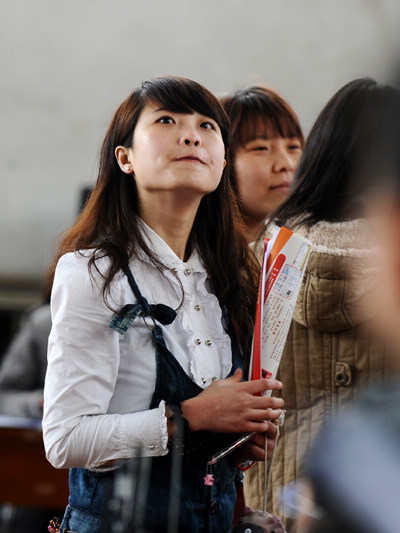|
 |
|
WORKING TIME: A university student checks employment information at a recruitment fair held by Shanxi University of Chinese Traditional Medicine on March 30 (YAN YAN) |
Xiao thinks that one reason for their being more realistic is that they encounter many life issues at an earlier age. "Studying abroad after graduation, finding a job, getting married and buying a house, all these issues that we experienced one by one at different stages of life they are now confronted with all at once, leaving not much cushion room for them," she said.
Xiao believes that too much information and too many choices bear down on the new generation.
Effects being brought
The advent of the post-90s graduates into the workplace has also forced companies to re-evaluate their management styles.
"This is only the first year that the new graduates are entering the job market, so no obvious influence can be seen yet. But as companies will certainly hire a majority of these fresh talents in the future, it will bring challenges," Wang with Deloitte China said. He thinks that both employers and employees should strive to work out any differences.
According to Lin, Microsoft Asia-Pacific Research and Development Group is trying to change its conventional management system to embrace post-90s employees. "We are experimenting to help those new employees adapt their personal academic thoughts to the cooperative business concepts within six months for a much stronger corporate culture," Lin said.
Shao Haisheng, a human resources director at Ctrip, a leading online travel company in China, said that post-90s interns have brought changes to his company. "They are full of creative and daring ideas. They are always willing to take the initiative, and are highly articulate, which makes for creative exchanges," Shao said. "Facing this situation, we become more tolerant and try to adapt to the needs of each individual employee."
Xiao believes that the generation's different mindset has the potential to revitalize the workplace. "In this sense, there is no need to be overly sensitive to how they express themselves, even if it's too direct or harsh. We just need to understand why they are saying what they say," Xiao said.
She said that the differences in opinion are really just generational differences. "For the post-70s and post-80s generations, a sense of responsibility meant accomplishing your work and being responsible for others. But for the post-90s generation, it is about applying learned knowledge to promote the progress of something, or showing concern for others and bringing happiness to themselves and others. This is probably in part due to their youth," Xiao said.
As one of the post-90s generation to have been labeled as non-mainstream, rebellious, irresponsible and Internet-obsessed, Tsinghua University graduate Tan responded, "We have our own personalities and it doesn't mean that we are not outstanding."
"Maybe we cannot totally understand those post-90s kids, but we must admit that they will become the backbone of the Chinese labor force in the next 10 to 15 years and bring about great impacts on the country's future trajectory," said Liu Xiaoying, a professor at the Communication University of China.
Email us at: yinpumin@bjreview.com | 